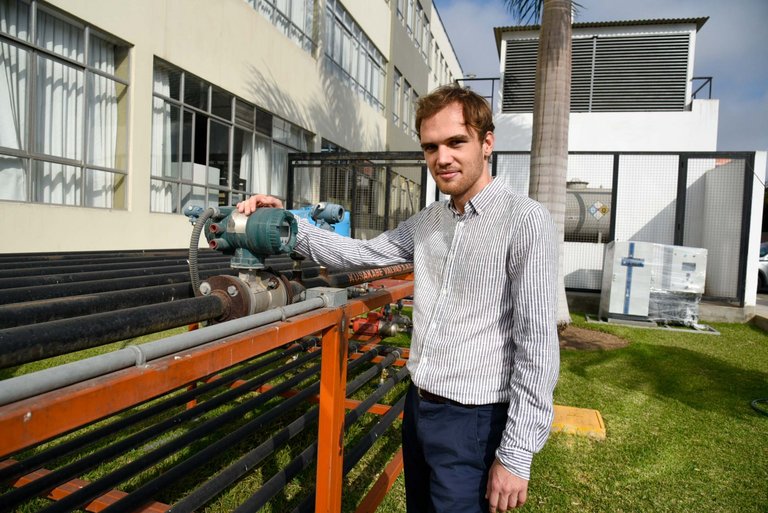Providing people with clean drinking water is one of the global challenges that not only scientists but also students at TU Ilmenau are tackling. Julius Rußmann recently completed his Master's degree in Technical Cybernetics and Systems Theory. In his master's thesis, he developed methods to quickly and accurately localize leaks in pipelines in Lima, Peru, as part of the EU research project "PUREWATER" - with the aim of minimizing water losses. In UNIonline, he reports on the exciting research environment at the Pontifical Catholic University of Peru (PUCP), where a double degree program at TU Ilmenau took him and where he worked with the state oil company Petroperu, among others.
Research project in Lima: TU Ilmenau graduate develops algorithms for detecting leaks in water pipelines

Prolonged periods of drought, declining maize and potato harvests, the threat of water shortages in large cities - the effects of global climate change on our drinking water requirements and our drinking water supply are already clearly noticeable today. At the same time, leaks in drinking water pipelines and illegal drinking water withdrawals are leading to significant water loss rates, which are still over five percent even in Germany. Latin American cities such as Lima or Mexico City even have rates of over 30 percent, meaning that the global economic cost of water loss is estimated at over 39 trillion US dollars.
These impressive figures motivated me to develop methods for quickly and accurately detecting and localizing leaks in pipelines as part of my master's thesis "Dynamic and Algebraic Observer Design for Leak Detection, Size Estimation and Localization in Water Pipe Systems". The master's thesis is part of the double master's program "Technical Cybernetics and Systems Theory" between the TU Ilmenau and the PUCP in Lima. The cooperation between the two universities, which also extends to the EU research project "PUREWATER" on multi-purpose desalination and drinking water treatment, enabled me to combine technical expertise and practical application in a way that was rich in results and experience.
Thanks to the doctoral student Matti Noack, who supervised me intensively, I was able to familiarize myself more deeply with the topic of model-based observers for so-called partial differential equations. These equations model not only the temporal but also the spatial dynamics of physical systems, which in the case of pipelines must be taken into account due to friction effects and the spatial transport from the pipeline inlet to the pipeline outlet.
For model-based parameter and state estimation, including for such PDE systems, Prof. Johann Reger and some of his doctoral students have been researching and advancing the application of the so-called modulation function method at the Control Engineering Group for several years. This approach represents an alternative to established model-based estimation methods such as the Kalman filter and promises a reduction in computing time and better suppression of measurement noise due to its fully algebraic observer design. With my master's thesis, I was able to contribute to researching the advantages and limitations of the modulation function method and expand the range of applications of this method to include leak detection and localization in drinking water pipelines.
I was involved in the research at the PUCP right from the start. In collaboration with the state oil company Petroperu, I worked on detecting and localizing leaks in the central northern Peruvian oil pipeline. The weekly exchange with the scientists at the PUCP gave me additional professional input and insights into the complexity and importance of the topic. In addition, the control engineering laboratory at the PUCP has a pilot plant in which water is pumped through a water pipeline that is almost 100 meters long. The system is equipped with all the sensors required to record the pressure and flow rate at several measuring points as well as the actuators to control the amount of water flowing in and to open leakage valves. I was particularly pleased and proud to experience the moment when my theoretical results were validated and the model-based algorithms I designed determined the outflowing water volume flow and the actual leakage position with the desired accuracy in the event of a leakage!
Being actively involved in the research projects of both universities at such an early stage gave me a wide range of insights into the international research environment at TU Ilmenau and the development of innovative approaches to solving global challenges. In addition, the research in my Master's thesis enabled me to deepen my knowledge from my academic training at TU Ilmenau.
This year, I plan to publish the results of my Master's thesis at a renowned specialist conference. I look back with gratitude on the research environment offered to me as a Master's student and can warmly recommend every student to take advantage of the numerous opportunities to enter the world of research at the TU Ilmenau - whether in the form of a laboratory internship, as a student assistant or as part of a thesis!
Contact us
Prof. Dr.-Ing. Johann Reger
Head of the Control Engineering Group

